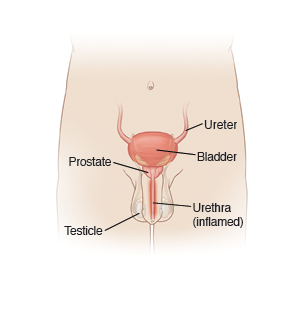Urethritis Due to Gonorrhea or Chlamydia (Adult Male)

You have urethritis. This is an inflammation in the urethra. The urethra is the tube between the bladder and the tip of the penis. Urine drains out of the body through the urethra. There are 2 main types of this condition:
Men are more likely to have symptoms, but may not. Symptoms can start within 1 week after exposure to an infection. Or they can take a month or more to appear. Or they may never occur. Some symptoms are:
-
Burning or pain when urinating.
-
Irritation in the penis.
-
Pus discharge from the penis.
-
Pain and possible swelling in one or both testicles.
Infections in the urethra are often caused by a sexually transmitted infection (STI). The most common STIs are gonorrhea, chlamydia, or both.
GU is an infection of the urethra. It's caused by gonorrhea. Gonorrhea is an STI. Gonorrhea can also be in other areas of the body. This can cause:
Without treatment, the infection can get worse and spread to other parts of your body. The infection can cause rashes and arthritis. It can also cause infections in your joints, heart, and brain.
Nongonococcal urethritis (NGU) is an infection of the urethra. It's often caused by chlamydia. Symptoms may clear up in a few weeks or months, even without treatment. But without treatment, the bacteria that cause NGU can stay in the urethra. This means that even if symptoms clear up, you can still have an infection. You can spread it to others if you are not treated.
Urethritis caused by an infection can be cured with antibiotics. If you don't get treated, you can give it to someone else. If you give it to a woman, it can cause a serious pelvic infection. She may not be able to have children (infertility).
It's important to remember that you can have an infection without symptoms. For this reason, your sex partner needs to be treated, even if they have no symptoms. If they are not treated, and you keep having sex, you will be infected again. Your partner should contact their own doctor to be checked and treated. An urgent care clinic or the Public Health Department can also do this.
Home care
These guidelines will help you care for yourself at home:
-
Take all the antibiotics you were given until they are used up. It's important to finish them, even if you are feeling better. This makes sure that the infection is completely cleared up.
-
Don't have sex until both you and your partner have finished all the antibiotics, and your doctor says you are no longer contagious.
-
You can take acetaminophen or ibuprofen for pain, unless you were given a different pain medicine. Talk with your doctor before using these medicines if you:
-
Have long-term (chronic) liver or kidney disease
-
Have ever had a stomach ulcer or gastrointestinal (GI) bleeding
-
Are taking blood thinners
-
Don’t take aspirin (or medicine that contains aspirin) if you are younger than age 19 unless directed by your doctor. Aspirin can put you at risk for Reye syndrome. This is a rare but very serious disorder. It most often affects the brain and the liver.
-
Learn about and use safe sex practices. The safest sex is with a partner who has tested negative and only has sex with you. Condoms may keep some STIs from spreading. These include gonorrhea, chlamydia, and HIV. But condoms can't guarantee you won't get these diseases.
Follow-up care
Follow up with your doctor, or as advised. If a culture test was taken, you may call for the results as directed. Another culture test should be done 4 to 6 weeks after treatment to be sure the infection is gone. Follow up with your doctor or the Public Health Department for a complete STI screening, including HIV testing. For more information about STIs, contact CDC-INFO at 800-232-4636.
When to get medical advice
Call your doctor right away if you have:
-
No improvement after 3 days of treatment, although some symptoms can last longer.
-
Problems urinating.
-
Rash or joint pain.
-
Painful sores on the penis.
-
Enlarged painful lymph nodes (lumps) in the groin.
-
Testicle pain or swelling of the scrotum.